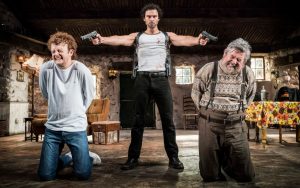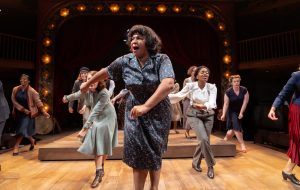The Humans exposes the fears at the heart of a modern family
[usr=4]

I love a family drama and they don’t come better than this. The Humans by Stephen Karam won four Tony awards when it was on Broadway. Now the original production directed by Joe Mantello has been imported with the same cast.
As a portrayal of a middle class family, it is spot on. Two parents meet with at their daughter’s new apartment in New York. Also in attendance are the daughter’s partner, sister and grandmother. The ensemble acting is terrific and they are absolutely believable as a bickering but loving family.
Click here for my YouTube review on One Minute Theatre Reviews
Reed Birney and Jayne Houdyshell are the mother and father disappointed by how life has turned out and frightened for the future of their family. Sarah Steele and Cassie Beck show a wonderful rapport as the sisters, both unhappy in how their careers are going. The partner could be there simply as a device to enable the family to explain what’s going in but Arian Moayed makes him a real character, nervous and desperate to please and placate.
A play about fear enhanced by a spooky atmosphere
This is a play about the fears that engulf so many of today’s middle class families- fear of failure, unemployment, poverty, loss of love, illness, dementia, death. You can see how these fears weigh physically on all the actors’ shoulders. They’re most manifest in the father, magnificently portrayed by Reed Birney, and they lead to a big revelation at the end.

The set designed by David Zinn is a realistic, naturalistic two floor gloomy apartment in New York which the couple have only just moved into. Their furniture has yet to arrive, so, although it is their home, it has a temporary, un-homely feel, like they could depart at any moment. This contributes to a feeling of spookiness that is ratcheted up by frightening noises from above and lights going out, suggesting darkness could descend at any moment.
All of this seems to say that while the causes of their fears may have names- the recession, globalisation, the technical revolution, ageing, and so on- these are forces as mysterious and uncontrollable as the gods and ghosts our ancestors believed in.
I found the play petered out a little at the end but I am so grateful to Hampstead Theatre for providing the opportunity to see this wonderful play.
The Humans is performing at Hampstead Theatre until 13 October 2018.
Watch the review of The Humans from One Minute Theatre Reviews on YouTube here-
















